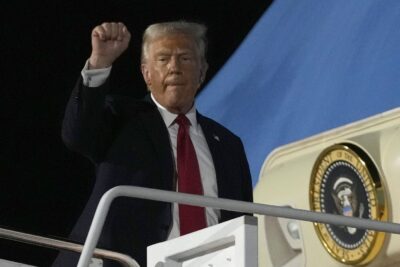Trump says 25 per cent tariffs are coming for steel and aluminum imports
By Canadian Press on February 10, 2025.

WASHINGTON — U.S. President Donald Trump says he’ll announce 25 per cent tariffs on all steel and aluminum imports into the United States on Monday — and there will be no carve-outs for America’s closest neighbours.
Trump told reporters about the impending duties on Air Force 1 as he flew to New Orleans to attend Sunday’s Super Bowl. The president also said he would announce “reciprocal tariffs” later this week.
Trump did not offer many details about his latest tariff threat as his rapidly changing geopolitical agenda sets America on a new course for foreign policy and trade.
Trump is scheduled to sign executive orders in the Oval Office Monday evening.
It’s all happening one week after Trump temporarily paused plans to slap Canada and Mexico with 25 per cent across-the-board tariffs and a lower 10 per cent levy on Canadian energy.
Trump delayed those levies until at least March 4 in response to border security commitments from both countries, saying it would allow time to reach a “final economic deal.”
Some experts say Trump’s tariffs are likely a first step in his plan to rattle the Canada-U.S.-Mexico Agreement ahead of a mandatory review in 2026.
Trump did not offer much relief on Sunday for Canadians hoping the delay would allow for a deal ending the tariff threat for good. He told Fox News anchor Bret Baier that he was not joking about making Canada the 51st state.
Canadian premiers are travelling to Washington this week on a joint mission to meet with Republicans lawmakers and attempt to sway the president away from the threatened duties.
Ontario Progressive Conservative Leader Doug Ford said he spoke with the CEOs of Stelco and Dofasco, prominent Canadian steel companies, about the looming tariffs Monday morning. Ford used Trump’s tariff threats as justification for calling a snap provincial election.
He said Ontario is prepared to react “hard” and “fast.”
In a media statement, Alberta Premier Danielle Smith cited the fact that the initial tariff threat was paused as “further evidence that diplomacy and action on border security matters.”
While Trump’s rhetoric about American expansion is sending shock waves around the world, his most recent tariff threat is similar to actions taken under his first administration, when the president scrapped the North American Free Trade Agreement.
During negotiations on the Canada-U.S.-Mexico Agreement, commonly dubbed “the new NAFTA,” Trump floated the idea of a 25 per cent tariff on the Canadian auto sector; it was never implemented.
He did use his national security powers to impose a 25 per cent tariff on steel imports and a 10 per cent tariff on aluminum imports in March 2018.
The day after announcing those levies, Trump posted on social media that “trade wars are good, and easy to win.”
Canada and other countries brought their own duties against the U.S. in response. They targeted products for political, rather than economic, reasons — things like yogurt and bourbon coming from the home states of Republican lawmakers.
Nearly a year later, on May 17, 2019, the White House announced a deal had been reached to prevent “surges” in steel and aluminum supplies from Canada and Mexico, ending the trade dispute.
Economists have said Trump’s initial tariffs on steel and aluminum were costly for American companies and consumers.
A report by the Washington-based Tax Foundation said companies were forced to pay higher prices, U.S. exports dropped and the duties resulted in the loss of about 75,000 manufacturing jobs.
About a quarter of all steel used in the United States is imported and Canada is the largest supplier, accounting for nearly 25 per cent of all steel imports in 2023. Data from the U.S. Department of Commerce shows Mexico provided almost 15 per cent of steel imports that year.
The Canadian steel industry has warned that a repeat of Trump’s tariffs would risk a return to the disruption and harm seen in 2018. Catherine Cobden, president and CEO of the Canadian Steel Producers Association, called on the federal government to intervene immediately with retaliatory tariffs.
— With files from Sonja Puzic in Toronto and Lisa Johnson in Alberta
This report by The Canadian Press was first published Feb. 10, 2025.
Kelly Geraldine Malone, The Canadian Press
28-27


